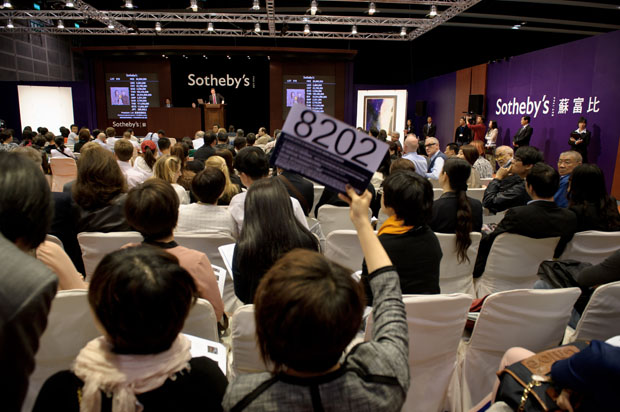Auction house Sotheby’s has held it’s first ever auction in China in response to growing demands for art and antiques amongst Chinese investors and collectors.
In a joint venture with state-owned Beijing Gehua Culturual Development group, in which Sotheby’s owns 80% of the share holding, Sotheby’s Beijing (Auction) Company Ltd. held its first commercial auction in mainland China on 1st December. The event was held in a luxury hotel in Beijing, and raised $37.3 million. In practice were privileges usually reserved for the Tianzhu Free Trade Zone, allowing buyers from outside China to save 23% in tax and customs duties usually payable for imported works.
Focusing on modern and contemporary art, the auction was sub-divided into four categories: New Wave 1980-1990s; 20th century Chinese art; Contemporary Chinese art; and Contemporary Chinese Ink. Auction records were broken for six artists in particular, including Yang Feiyun, Li Guijun, Chen Danquing, Duan Jianwei and Ma Ke.
Beijing-born artist Zao Wou-ki’s work Abstraction brought in the highest bid at a cool $14.7 million. Acquired in 1961, the piece was sold by the Art Institute of Chicago to Zhang Xiaojun, a collector from coal-rich Shanxi province. Sotheby’s Asia CEO Kevin Ching told Reuters that Zao “will become, or may already be, the Picasso of China”.
Other pieces up for auction included Ai Xuan’s Tibetan Girl (which was sold for $540,000); Pablo Picasso’s Le Peintre; Yang Feiyn’s Little Actress; Wang Jinsong’s One Child Policy Series No. 5 and No. 12 (two works) and Rembrandt’s Portrait of a Man with Arms Akimbo. In addition there were 19th century furniture and decorative arts for sale.
Alongside the auction, Sotheby’s “Beijing Art Week” featured a series of educational programmes for art lovers, students, collectors and general members of the public.
In September of this year, Christie’s held its first China-based auction in Shanghai, successfully selling $25 million worth of watches, wine, jewellery and art. Christie’s is the first foreign auction house to operate in China without a local partner.







